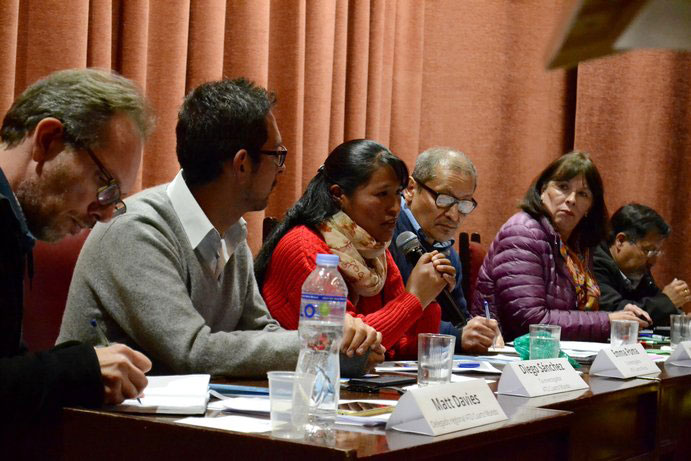Poverty: Should We Stay Silent?

In 2019 ATD Fourth World in Bolivia presented a new report on dimensions of poverty. Developed using participatory research methods, Poverty: Should We Stay Silent? is the latest national report from a three year international research effort.
Learn about other national reports.
Headed by ATD Fourth World and Oxford University, the rigorous international research project sought to identify the dimensions of poverty in six countries. The work relied on in-depth participation of people who live with poverty on a daily basis. As a result, the project helps us better understand how poverty is not only a lack of income or material goods.
Over three years, the participatory research work in Bolivia brought together the ideas and perspectives of people in situations of poverty. In addition, academics and other professionals such as teachers or social workers took part in the research. Some of the ten dimensions the report identified have been mentioned in existing studies. However, new dimensions detail experiences that families in extreme poverty frequently undergo in their personal lives. Rarely seen or understood by the general public, these are nevertheless key aspects of poverty.
Specifically, these lesser known dimensions describe how people in poverty are frequently blamed for the conditions they live in and decisions they make.
Unrecognized contributions
The Bolivia report points out that people living in poverty contribute to society with skills and knowledge that others do not recognize or value. In addition, society’s indifference often leads people in poverty to believe that they have no skills or valuable ideas.
“We are very skilled at getting financial resources,” said one person in poverty. “We know how to weave. We can sell things and recycle… We know how to do so many things. But nobody says, ‘they’re making an effort.’ It is invisible to them.”
Constant suffering
The dimension of constant suffering describes how the never ending worries of life in poverty cause ongoing pain and humiliation. This eventually affects a person’s entire being, often leading to despair. Feeling powerless to escape poverty, people can lose hope for a better future.
“I can’t get to sleep,” said one research participant. “I’m thinking about what I should do, about what I’m going to give my children to eat. I feel very bad. I have a pain here in my chest.”
“Limited resources lead to less hope about the things a person wants to do. Along that path a person’s mental and physical health deteriorate,” added an academic.
Social abuse
The social abuse dimension describes how power relationships and inequality lead others to discriminate against, humiliate and ignore people experiencing poverty. Frequently this occurs in many areas of their daily lives simultaneously.
“People stare at us because they know that we are poor,” explained another research participant.
“We discriminate because of our ignorance,” added a professional. “We don’t know about their lives. We do not understand their reality.”
Struggle to carry on
While poverty can beat people down in many ways, the Bolivia research also identified “the struggle to carry on” as an important dimension of poverty. Powerful descriptions show people in poverty struggling day in and day out against adverse conditions. Almost always, their struggle is fueled by hope that their children will not suffer the same hardships that they did.
“My children and I gather what little money we have saved and say, ‘next month we will buy calamine with this, stucco…’ Now we see the money we have collected and we feel happy. We have not come out of poverty, but I believe that we will get out,” said a research participant.
The Bolivia research report was presented on 29 May 2019 in the auditorium at the Universidad Mayor de San Andrés, La Paz, Bolivia. Its groundbreaking results relied on a research methodology called Merging of Knowledge. This approach, developed by ATD Fourth World over many years, can significantly transform any initiative, project or program designed to eradicate poverty.
Video in Spanish on the Bolivia report:


Play with YouTube
By clicking on the video you accept that YouTube drop its cookies on your browser.
Download the full report in Spanish: Poverty: Should We Stay Silent?
More about ATD Fourth World in Bolivia
More about ATD’s international Dimensions of Poverty research

